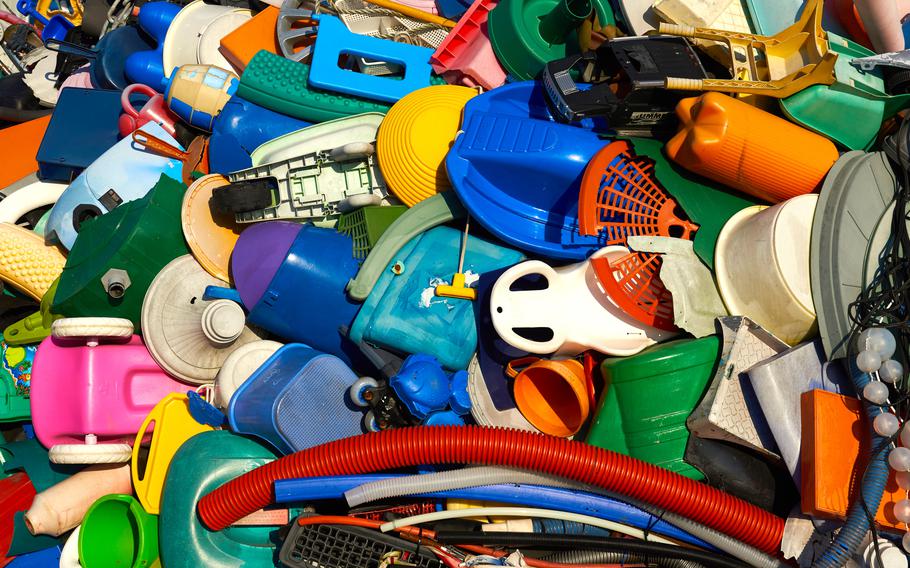
Our plastic usage will give future historians much to investigate. (iStock)
Despite the fact that I live in a coastal New England village where one expects snowy Currier and Ives scenery this time of year, the first weeks of winter have been drearily damp, foggy and muddy. But we maple syrup-swilling Yankees weren’t the only ones robbed of a white Christmas.
Most of the Northern Hemisphere has experienced warmer temperatures this season, affecting crops, exposure to allergens and the winter sports season. Heck, even up at the Minnesota Ice Festival, where ice carvers were planning to unveil the world’s largest ice maze on January 5th, the event was canceled due to the danger of ice structures melting.
When I read all the pessimistic scientific research about our warming globe, I find it hard to contemplate Earth’s destiny. Perhaps out of fear, my brain short-circuits, making it impossible for me to envision a future in which winters cease, ice caps disappear and the Earth self-destructs. Instead, I prefer to believe that, somehow, Mother Nature or God or the Great Gazoo will save humankind, regardless of climate change or human foul-ups.
Consider, if you will, a winter thousands of years from now …
January, in the year 5024.
Despite several hundred World Wars, twelve Ice Ages, nine asteroid hits, three robot takeovers, seven alien invasions and an unfortunate but brief worldwide prohibition on bacon, human beings have survived.
The Earth, along with its sister colonies on Mars and Venus, is experiencing her 177th recorded Period of Enlightenment – a time of flourishing advances in science, art, philosophy, culture and, ever since the recent eradication of male pattern baldness, cosmetology.
With public interest in ancient history on an upswing, more and more young scholars have chosen to study Archaeology, a science which had been somewhat neglected in recent centuries. One aspiring graduate student, Fizzeq, is the Principal Investigator of an archaeological excavation that has captured the world’s attention. Mr. Fizzeq’s Data Recovery site is located at Sector 52b, formerly known as the Balfour Beatty military housing complex at Tinker Air Force Base, Okla.
Ever since the Great Ocean receded to prehistoric levels, evidence of complex ancient civilizations has been exposed, dating back as early as the 21st century. Although most artifacts have eroded, a curious substance known as “plastic” is conspicuously present in the strata of Mr. Fizzeq’s survey, shedding light on the ethnography of this ancient society.
Shortly after breaking ground, the archaeological team uncovers an assemblage of brightly-colored plastic artifacts. A fleet of tiny red cars, several hundred whimsically pastel-colored houses, countless itty-bitty kitchenettes and numerous eensy-weensy tool benches are unearthed, all bearing the mark of the manufacturer, “Little Tikes.” Naturally, Mr. Fizzeq concludes that the humanoids of this era, or at least the Air Force families, were no taller than three feet.
Perplexing is the presence of thousands of bottles of purified water, contradicting evidence that 21st century people had plenty of fresh water to drink. Even more puzzling is the discovery of a multitude of knotted plastic bags, containing petrified canine fecal matter, more commonly known as “doggie doo doo.” Mr. Fizzeq wonders why this tiny ancient culture felt the need to bag up a naturally prolific substance.
After all, everyone poops.
Other items found preserved in copious amounts include strange footwear labeled “Crocs,” beverage implements known as K-cups, Ikea furniture, Tupperware containers, defunct television remotes and molded plastic lawn furniture
But the most amazing discovery is found just beneath the excavation’s datum point. Deep in the ancient strata of the Tinker AFB quarters lay the well-preserved remains of an ancient tool of communication, known as an “iPhone.” By extracting its data, Fizzeq believes he will reveal a complete chronology of 21st century humans that will blow the top off the archaeological world.
However, exhaustive laboratory testing produces nothing except a curious language of colloquial terms including “idk” “lol” “srsly” and “rofl.” And several dozen digital videos bearing the common tag “twerk.”
Despite this disappointment, Mr. Fizzeq goes on to successfully publish his doctoral thesis, appropriately entitled, “The Plastic Age: An archaeological analysis of the strange little humans of the 21st century.” However, he is forced to cut his lucrative speaking tour short, after breaking his leg in a winter skiing accident.
Read more at themeatandpotatoesoflife.com and in Lisa’s book, “The Meat and Potatoes of Life: My True Lit Com.” Email: meatandpotatoesoflife@gmail.com